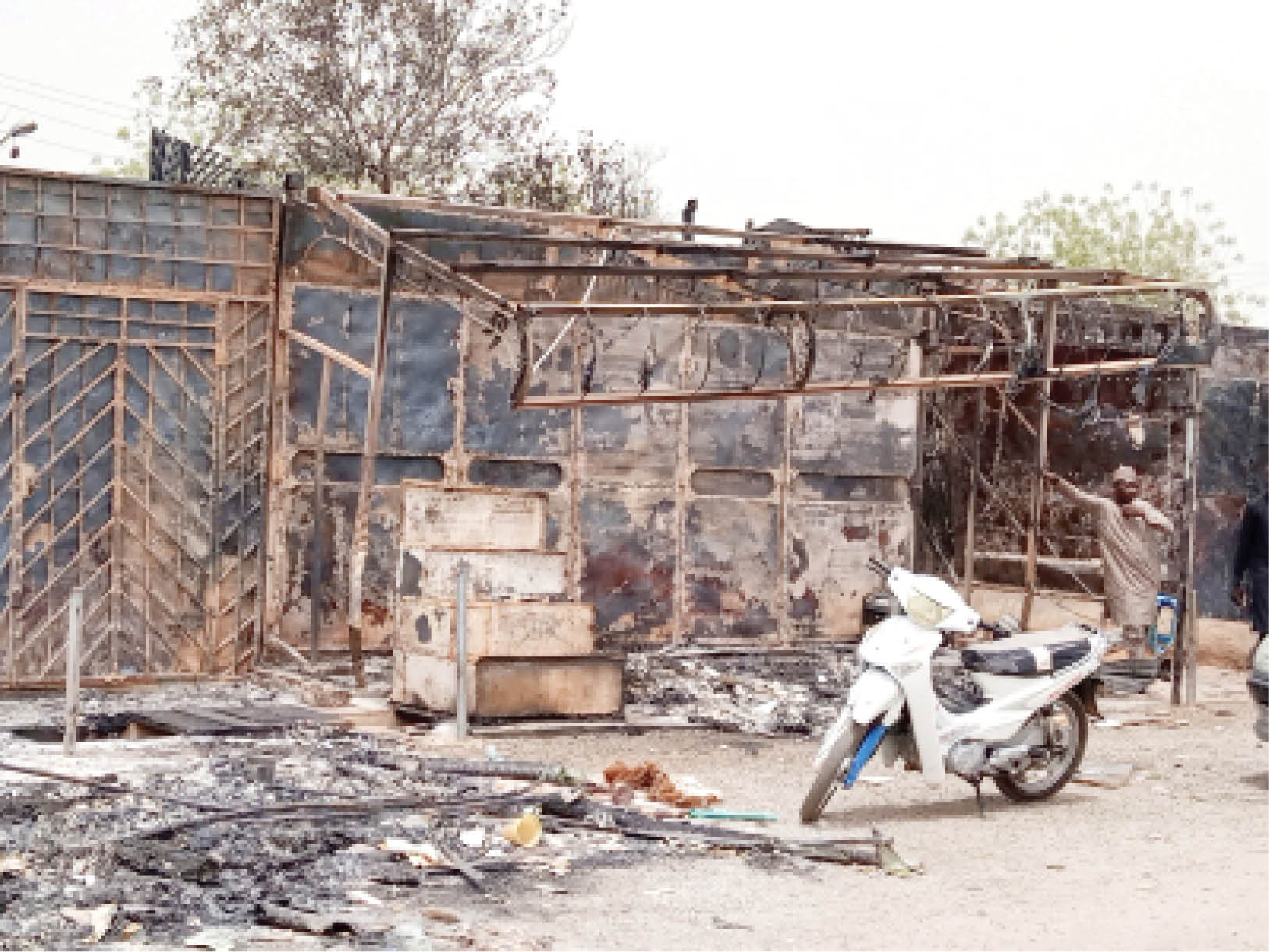Katsina market fire, one disaster too many
Hundreds of shops at the Katsina central market were recently razed down following a fire outbreak on Monday, March 22, 2021. The inferno, in spite of the efforts by firefighting personnel, lasted more than three hours. The fire was said to have begun in the morning but was not noticed until much later as shop […]

Some part of the burnt market
Hundreds of shops at the Katsina central market were recently razed down following a fire outbreak on Monday, March 22, 2021. The inferno, in spite of the efforts by firefighting personnel, lasted more than three hours.
The fire was said to have begun in the morning but was not noticed until much later as shop owners were yet to open for business at the time. Media reports indicate that the fire started at the north gate end of the market. Properties worth billions of naira, including clothing materials, gold-plated necklaces, shoes, kitchen utensils, carpets, and plastics were lost in the fire. At least two rows of the market’s stores were razed down, with one of the rows having more than 50 shops.
Governor Aminu Bello Masari, who visited the market shortly after the inferno, expressed shock over the incident. While sympathising with victims, he said the state government would look into the root cause of the fire. He frowned against the sale of gas and petroleum products in the market, adding that the incident and level of destruction is unprecedented in the annals of the state’s history.
The governor also added that government would use the misfortune to address some needs of the marketers, with a view to assisting those who lost valuables, as a way to cushioning the effect.
The chairman of the traders’ association of the market, Abbas Albaba, ruled out electrical fault as the cause of the incident, as there was no power at the time the incident occurred.
Less than a week after the Katsina market fire incident, goods worth millions of naira were again destroyed in a midnight fire that gutted Gashua market in Yobe State.
In recent times, market fires have become too regular than envisaged in the country; as a result, many markets have been razed. Between January and March this year alone, 12 separate fire incidents were recorded.
They include the fire incident at Kugbo market, along the Abuja-Keffi expressway; Alade market in Somolu, Lagos State; Tipper Garage market, 3rd avenue in Gwarimpa, Abuja; Bode-Sadu market in Moro Council, Kwara State; Bababa Plaza in Wunti market, Bauchi State; Shehu Shagari Modern Market in Sokoto; Ijesha market in the Oshodi area of Lagos; Sabo market in Oyo State; Marine Base Timber Market in Port Harcourt, Rivers State; central market in Potiskum, Yobe State and Tudunwada market in Gusau, Zamfara State.
The delays experienced in the arrival of firefighters when fire incidents occur contribute to the huge loss of properties in most cases. But even when they arrive on time, the unplanned nature of many market places in the country usually hamper their easy movement and equipment during such incidents.
Sadly, most shop owners and traders in Nigerian markets do not have their goods and businesses insured, which is why they lose everything without compensation when fire incidents occur. Worst still, this group of victims are usually ordinary people who have nothing to fall back on.
When reconstructing burnt markets, local government and municipal authorities should create enough passages that would ease access for firefighters and their equipment in the event of fire outbreaks. Efforts should be made to also amend existing design of markets along this line. Where possible, firefighting trucks should be provided and stationed close to markets. Authorities that collect market levies from traders and shop owners have a responsibility to ensure their safety and that of their goods.
While we urge the Katsina State Government, other state governments, corporate organisations and philanthropists to assist victims of market fire, we encourage management boards of markets across the country to educate traders and shop owners on the need to have their businesses insured with appropriate insurance companies. This way, victims of market fires would not find it difficult to recover from losses suffered in such incidents.
